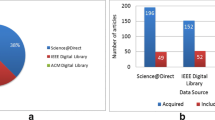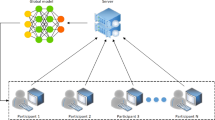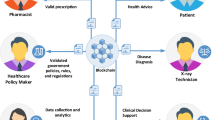Abstract
Federated Learning (FL) is a promising approach to enabling machine learning on decentralized data. It allows multiple clients to train a global model without transferring their data to a central server. However, traditional federated learning suffers from privacy and security problems due to the potential leakage of sensitive information. Existing consensus algorithms such as Proof of Work (PoW), Proof of Stake (PoS), Delegated Proof of Stake (DPoS) etc., are not scalable and efficient for permissioned blockchain networks. In this paper, we propose a blockchain-based federated learning approach using the Proof of Authority (PoA) consensus algorithm to address these issues. The proposed framework leverages the immutability and transparency of blockchain to ensure the integrity and privacy of the data during the federated learning process. We evaluate the proposed blockchain-based FL approach on a simulated dataset, and the results show that it achieves a higher level of accuracy, efficiency, privacy and security compared to existing approaches. We also compare the PoA consensus algorithm with other consensus algorithms. The proposed approach, Blockchain-based Federated Learning (BC-FL) is designed to be more communication efficient, scalable, and secure than existing approaches in blockchain-based FL systems.








Similar content being viewed by others
Data availability
Not applicable.
References
Tourani R, Misra S, Mick T, Panwar G (2017) Security, privacy, and access control in information-centric networking: A survey. IEEE Commun Surv Tutorials 20(1):566–600
Varalakshmi P, Narmadha K, Niveditha B, Akshaya A, Sarah S (2022) An efficient reliable federated learning technology. In: 2022 International Conference on Innovative Computing, Intelligent Communication and Smart Electrical Systems (ICSES), pp. 1–5. IEEE
Liu Z, Guo J, Yang W, Fan J, Lam KY, Zhao J (2022) Privacy-preserving aggregation in federated learning: A survey. IEEE Trans Big Data 1–20
Nguyen DC, Ding M, Pham Q-V, Pathirana PN, Le LB, Seneviratne A, Li J, Niyato D, Poor HV (2021) Federated learning meets blockchain in edge computing: Opportunities and challenges. IEEE Internet Things J 8(16):12806–12825
Feng L, Zhao Y, Guo S, Qiu X, Li W, Yu P (2021) Blockchain-based asynchronous federated learning for internet of things. IEEE Trans Comput 99(1):1–9
Kim H, Park J, Bennis M, Kim S-L (2019) Blockchained on-device federated learning. IEEE Commun Lett 24(6):1279–1283
Dai H-N, Zheng Z, Zhang Y (2019) Blockchain for internet of things: A survey. IEEE Internet Things J 6(5):8076–8094
Wu X, Wang Z, Zhao J, Zhang Y, Wu Y (2020) Fedbc: blockchain-based decentralized federated learning. In: 2020 IEEE International Conference on Artificial Intelligence and Computer Applications (ICAICA), pp. 217–221. IEEE
Huang J, He D, Obaidat MS, Vijayakumar P, Luo M, Choo K-KR (2021) The application of the blockchain technology in voting systems: A review. ACM Comput Surv (CSUR) 54(3):1–28
Yusoff J, Mohamad Z, Anuar M (2022) A review: Consensus algorithms on blockchain. J Comput Commun 10(9):37–50
Xu J, Wang C, Jia X (2023) A survey of blockchain consensus protocols. ACM Comput Surv 1–34
Mingxiao D, Xiaofeng M, Zhe Z, Xiangwei W, Qijun C (2017) A review on consensus algorithm of blockchain. In: 2017 IEEE International Conference on Systems, Man, and Cybernetics (SMC), pp. 2567–2572. IEEE
Guru A, Mohanta BK, Mohapatra H, Al-Turjman F, Altrjman C, Yadav A (2023) A survey on consensus protocols and attacks on blockchain technology. Appl Sci 13(4):2604
Chen H, Asif SA, Park J, Shen CC, Bennis M (2021) Robust blockchained federated learning with model validation and proof-of-stake inspired consensus. arXiv preprint arXiv:2101.03300 1–9
McMahan B, Moore E, Ramage D, Hampson S, Arcas BA (2017) Communication-efficient learning of deep networks from decentralized data. In: Artificial Intelligence and Statistics, pp. 1273–1282. PMLR
Kang J, Xiong Z, Jiang C, Liu Y, Guo S, Zhang Y, Niyato D, Leung C, Miao C (2020) Scalable and communication-efficient decentralized federated edge learning with multi-blockchain framework. In: Blockchain and Trustworthy Systems: Second International Conference, BlockSys 2020, Dali, China, August 6–7, 2020, Revised Selected Papers 2, pp. 152–165. Springer
Rehman MH, Salah K, Damiani E, Svetinovic D (2020) Towards blockchain-based reputation-aware federated learning. In: IEEE INFOCOM 2020-IEEE Conference on Computer Communications Workshops (INFOCOM WKSHPS), pp. 183–188. IEEE
Lu Y, Huang X, Zhang K, Maharjan S, Zhang Y (2020) Low-latency federated learning and blockchain for edge association in digital twin empowered 6g networks. IEEE Trans Industr Inf 17(7):5098–5107
Ma C, Li J, Shi L, Ding M, Wang T, Han Z, Poor HV (2022) When federated learning meets blockchain: A new distributed learning paradigm. IEEE Comput Intell Mag 17(3):26–33
Zhang J, Liu Y, Wu D, Lou S, Chen B, Yu S (2022) Vpfl: A verifiable privacy-preserving federated learning scheme for edge computing systems. Digit Commun Netw 1–9
Yang Z, Shi Y, Zhou Y, Wang Z, Yang K (2022) Trustworthy federated learning via blockchain. IEEE Internet Things J 10(1):92–109
Zhang Y, Tang Y, Zhang Z, Li M, Li Z, Khan S, Chen H, Cheng G (2023) Blockchain-based practical and privacy-preserving federated learning with verifiable fairness. Mathematics 11(5):1091
Wei K, Li J, Ding M, Ma C, Yang HH, Farokhi F, Jin S, Quek TQ, Poor HV (2020) Federated learning with differential privacy: Algorithms and performance analysis. IEEE Trans Inf Forensics Secur 15:3454–3469
Wang Q, Huang J, Wang S, Chen Y, Zhang P, He L (2020) A comparative study of blockchain consensus algorithms. In: Journal of Physics: Conference Series, vol. 1437, p. 012007. IOP Publishing
Kaur S, Chaturvedi S, Sharma A, Kar J (2021) A research survey on applications of consensus protocols in blockchain. Secur Commun Netw 2021:1–22
Khordadpour P (2023) Efficient privacy-preserving framework for federated and blockchain networks 1–8
Gilad Y, Hemo R, Micali S, Vlachos G, Zeldovich N (2017) Algorand: Scaling byzantine agreements for cryptocurrencies. In: Proceedings of the 26th Symposium on Operating Systems Principles, pp. 51–68
Guo G, Zhu Y, Chen E, Zhu G, Ma D, Chu WC (2022) Continuous improvement of script-driven verifiable random functions for reducing computing power in blockchain consensus protocols. Peer-to-Peer Netw Appl 1–20
An AC, Diem PTX, Van Toi T, Binh LDQ, et al (2019) Building a product origins tracking system based on blockchain and poa consensus protocol. In: 2019 International Conference on Advanced Computing and Applications (ACOMP), pp. 27–33. IEEE
Cao B, Zhang Z, Feng D, Zhang S, Zhang L, Peng M, Li Y (2020) Performance analysis and comparison of pow, pos and dag based blockchains. Digit Commun Netw 6(4):480–485
Xiao Y, Zhang N, Lou W, Hou YT (2020) A survey of distributed consensus protocols for blockchain networks. IEEE Commun Surv Tutorials 22(2):1432–1465
Chaudhry N, Yousaf MM (2018) Consensus algorithms in blockchain: Comparative analysis, challenges and opportunities. In: 2018 12th International Conference on Open Source Systems and Technologies (ICOSST), pp. 54–63. IEEE
Hou D, Zhang J, Man KL, Ma J, Peng Z (2021) A systematic literature review of blockchain-based federated learning: Architectures, applications and issues. In: 2021 2nd Information Communication Technologies Conference (ICTC), pp. 302–307. IEEE
Huang Z, Zheng P, Zheng Z, Li Y (2022) Lock-based proof of authority: A faster and low-forking poa fault tolerance protocol for blockchain systems. In: Blockchain and Trustworthy Systems: 4th International Conference, BlockSys 2022, Chengdu, China, August 4–5, 2022, Revised Selected Papers, pp. 348–361. Springer
Kang J, Li X, Nie J, Liu Y, Xu M, Xiong Z, Niyato D, Yan Q (2022) Communication-efficient and cross-chain empowered federated learning for artificial intelligence of things. IEEE Trans Netw Sci Eng 9(5):2966–2977
Song J, Bai F, Zhu Y, Shen T, Xie A (2022) An improved-poa consensus algorithm for blockchain-empowered data sharing system. In: Proceedings of the 2022 4th Blockchain and Internet of Things Conference, pp. 128–134
Viswanathan K, Yazdinejad A (2022) Security considerations for virtual reality systems. arXiv preprint arXiv:2201.02563 1–6
Kazemi M, Yazdinejad A (2021) Towards automated benchmark support for multi-blockchain interoperability-facilitating platforms. arXiv preprint arXiv:2103.03866 1–15
Sisk M, Majlis M, Page C, Yazdinejad A (2022) Analyzing xai metrics: Summary of the literature review 1–7
Zolfaghari B, Yazdinejad A, Dehghantanha A (2022) The dichotomy of cloud and iot: Cloud-assisted iot from a security perspective. arXiv preprint arXiv:2207.01590 1–23
Funding
This work was supported in part by the Na- tional Natural Science Foundation of China under Grant 62172441, Grant 62172449, and Grant 61772553, in part by the Local Science and Technology Developing Foundation Guided by Central Government under Free Exploration Grant 2021Szvup166, and in part by the Opening Project of State Key Laboratory of Nickel and Cobalt Resources Comprehensive Utilization under Grant GZSYS-KY-2022-018 and Grant GZSYS-KY-2022–024.
Author information
Authors and Affiliations
Contributions
Irshad Ullah conceptualized the research goals and aims, designed the technical framework. He made a significant intellectual contribution to the presentation of the research work, specifically writing the initial draft. Xiaoheng Deng made a significant intellectual contribution to the theoretical development and system. Specifically, he is responsibility for the research activity planning and execution, including mentorship to the core team. Xinjun Pei, Ping Jiang, and Husnain Mushtaq made a significant intellectual contribution to the establishment of methodology and implementation of the computer code and supporting algorithms.
Corresponding author
Ethics declarations
Ethics approval
Not applicable.
Consent to publish
All authors unanimously agree to publish the paper.
Conflict of interest
The authors declare that they have no conflict of interest.
Additional information
Publisher's Note
Springer Nature remains neutral with regard to jurisdictional claims in published maps and institutional affiliations.
This article is part of the Topical Collection: 2 - Track on Security and Privacy
Guest Editor: Rongxing Lu
Rights and permissions
Springer Nature or its licensor (e.g. a society or other partner) holds exclusive rights to this article under a publishing agreement with the author(s) or other rightsholder(s); author self-archiving of the accepted manuscript version of this article is solely governed by the terms of such publishing agreement and applicable law.
About this article
Cite this article
Ullah, I., Deng, X., Pei, X. et al. A verifiable and privacy-preserving blockchain-based federated learning approach. Peer-to-Peer Netw. Appl. 16, 2256–2270 (2023). https://doi.org/10.1007/s12083-023-01531-8
Received:
Accepted:
Published:
Issue Date:
DOI: https://doi.org/10.1007/s12083-023-01531-8




